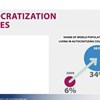deadlines
No declines in mental health among young adults at the beginning of the pandemic
When restrictions were introduced at the beginning of the pandemic, many assumed that young adults' mental health would deteriorate rapidly due to factors such as social isolation, unemployment and ec
The Institute for Futures Studies is appointing a researcher
The Institute for Futures Studies is appointing a researcher to the project Children’s living conditions in a changing society: Socioeconomic and ethnic inequality. Deadline for applications is March 16. Ad (pdf-file)
IF in search of new Director
Since Peter Hedström will be leaving the Institute on the 31st of August, the board is now recruiting his successor. This person will be taking on the responsibility of developing the future work of t
Calls for 2 PhD positions in a research program on partnerships for sustainable development
Calls for 2 PhD positions in a new research program Transformative Partnerships for Sustainable Development: Assessing synergies, effectiveness and legitimacy of United Nations Multi-stakeholder Partne.
Competition: Your vision of a positive future
The Paris Institute for Advanced Study and the 2100 Fondation in partnership with the Institute for Futures Studiesare launching the first Positive Future competition in order to encourage the elaboration
Researchers wanted for a project on children's living conditions
The Institute for Futures Studies (IF), Stockholm, is appointing one or two researchers (sociologist/social scientist) to the projects: YOUNG: Children’s living conditions in a changing society: SocioeYOUNGWORK: Early labour market outcomes of young adults

Anna Lührmann: Walking the Talk. Which Parties Threaten Democracy?
The recent increase of democratic declines around the world has sparked a new generation of studies on the topic. Scholars agree that these days the main threat to democracy arises from democratically
Changes in young adults' mental well-being before and during the early stage of the COVID-10 pandemic: disparities between ethnic groups in Germany
Child and Adolescent Psychiatry and Mental Health 15:69 (2021) Abstract The COVID-19 pandemic resulted in substantial disruptions to the daily lives of young people. Yet knowledge is lacking about change = 25). Respondents provided information on mental well-being (psychosomatic complaints, anxiety, depression, life satisfaction) and exposure to pandemic-related stressors (financial worries, health worries, discrimination, contact with COVID-19). Responses on mental well-being were matched to responses from two pre-pandemic waves.
Persistent boundaries. Partnership patterns among children of immigrants and natives in Sweden
Journal of Ethnic and Migration Studies Abstract Integration theories assume that ingroup partnering (endogamy) among individuals of immigrant background declines as their exposure to majority society i
Research seminar with Johanna Rickne: The Class Ceiling in Politics
Venue: Institutet för framtidsstudier, Holländargatan 13, 4th floor, Stockholm, or online.Research seminar with Johanna Rickne, professor of Economics at SOFI, Stockholm University.Register hereAbstracPrior studies have documented that working-class individuals rarely become parliamentarians. We know less about when in the career pipeline to parliament workers disappear, and why. We study these questions using detailed data on the universe of Swedish politicians’ careers over a 50-year period. We find roughly equal-sized declines in the proportion of workers on various rungs of the political career ladder ranging from local to national office. We reject the potential explanations that workers lack political ambition, public service motivation, honesty, or voter support. And while workers’ average high school grades and cognitive test scores are lower, this cannot explain their large promotion disadvantage, a situation that we label a class ceiling. Organizational ties to blue-collar unions help workers advance, but only to lower-level positions in left-leaning parties. We conclude that efforts to improve workers’ numerical representation should apply throughout the career ladder and focus on intra-party processes.








